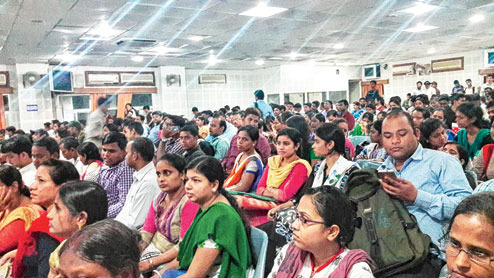
Hundreds of job aspirants at the Odisha University of Agriculture and Technology to apply for the three data entry operator posts in Bhubaneswar on Monday. Telegraph picture
Bhubaneswar, Sept. 25: The walk-in interview that was supposed to be over within an hour stretched for the entire day. Yet, the selection could not take place owing to the unexpectedly high number of candidates.
When the authorities realised nearly a thousand candidates had turned up, they decided to conduct a written examination to shortlist candidates for the interview.
Interestingly, the contract job for which the advertisement was given was for a 'data-entry operator-cum-office assistant' and the tenure of the job was only for one-and-a-half years.
While the required qualification for the post was graduation with mandatory knowledge of computer, candidates with BTech, MCA and law degrees turned up for the job interview.
Odisha University of Agriculture and Technology (OUAT) had given an advertisement for filling up three posts under an IRRI-OUAT collaborative project.
While 600 candidates were able to register their names for the interview, nearly an equal number waited outside the hall unable to register their names. Dean of research, OUAT, P.N. Jagdev said: 'In my entire career, I have never seen such rush for only three posts... that too for data-entry-operator-cum-office-assistant jobs.'
Though the interview was supposed to start around 11.30am, the screening process through a written test could not begin till 4pm.
Speaking to the aspirants, Jagdev, who was seen dealing with the candidates single-handedly, said: 'We had not prepared for such a big crowd. Though we had advertised for walk-in interview, because of the rush, we have decided to go for a 30-minute written test. Only those who qualify the test would be called for the interview.'
The screening test began around 4.45pm. But many candidates had left before the examination began.
Sobhan Patnaik, a BTech, said: 'I have been going to interviews for the past two years but nothing has worked out so far. This is why I decided to apply for the data entry operator job.'
He said his family had spent nearly Rs 8 lakh on his education, but he still could not get a job. 'What will I tell to my parents? They will not understand how we have become victims of unemployment in the state,' he said.
Sabita Mohanty, who has a law degree and a postgraduate diploma in computer application from Utkal University, said: 'There is an acute dearth of jobs. Wherever you go, hundreds apply for a single post.'
'The job of a data-entry-operator and office assistant requires some specific skills. But in general jobs, the number of candidates appearing for an interview is even more,' she said.
'The authorities were forced to conduct a written examination to eliminate candidates. But the pattern of examination was bad.'
The profile of aspirants reflects the mammoth proportions the problem of unemployment has acquired in the state. The reality appears very different from the state government's claim of generating jobs. Nearly 1.38 lakh government positions are currently lying vacant.
In 2015, 31,410 young men and women had come to Barabati stadium to appear for a test of recruitment against 54 Group-D posts of peons, orderlies, night watchmen and sweepers with a pay scale of Rs 4,750 to Rs 14,680 advertised by the office of Cuttack district judge.
The aspirants, who just need to have passed Class VIII examination with an elementary knowledge of Odia and English to sit for the test, had included graduates, postgraduates and engineering graduates. Odisha produces nearly 18,000 engineering graduates every year while 1.25 lakh graduates pass out of general colleges. But desperation among them has been growing because of the dismal employment scenario.
The state government has failed in its efforts to change the situation. Attempts have also been made to coerce private entrepreneurs setting up industries in the state to absorb local youths but that has not worked very well so far.
While big industries such as South Korean steel major Posco project having left the state, several industries have failed to take off. The state government started an employment mela in 2014 for engineering and MBA graduates but it did not yield the desired results. Later, the government stopped these programmes. Sources said the government had been forced to postpone the 'mela' repeatedly because the recruiting companies appeared reluctant to absorb fresh graduates.










